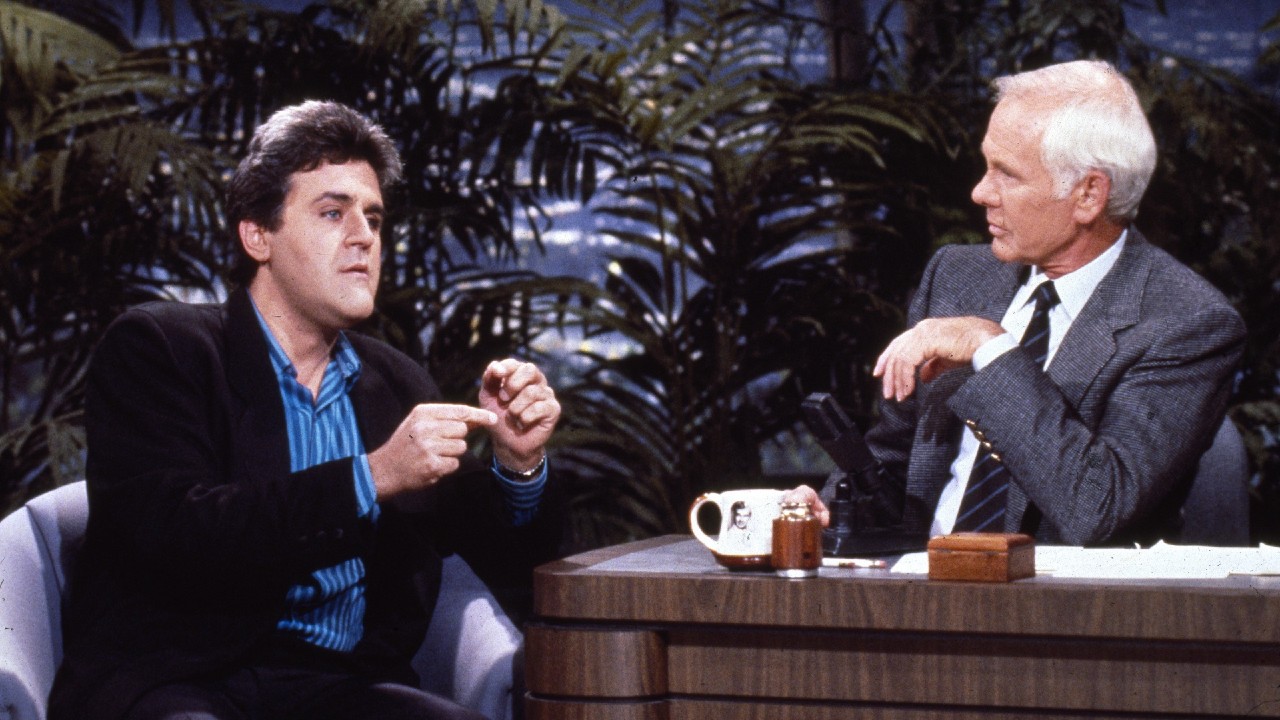Exclusive Interview: Kung Fu Panda 2 Writers Glenn Berger and Jonathan Aibel

In 2008, screenwriters Glenn Berger and Jonathan Aibel shocked audiences when they took an idea called Kung Fu Panda - a movie about an overweight bear who learns martial arts – and turned it into a film that both adults and kids could watch and love. Even more surprising? They’ve done it again with Kung Fu Panda 2.
Earlier this week I was granted the opportunity to speak with Berger and Aibel about the making of the film and, like my interview with Bridesmaids director Paul Feig from a couple weeks back – I was granted a wonderfully long time to speak with them. So long, in fact, that I had to split the interview into two parts. In part one, which you can find below, we discussed the effect of long term planning on the script writing process, the kung fu and Shakespearean inspirations, and choosing a peacock as the film's main villain.
A couple of months ago I read a quote from Jeffrey Katzenberg that actually said that there are a total of six Kung Fu Panda movies planned out, or mapped out as he said, and I’m curious, where is each one in development? Like how forward thinking do you guys move?
Jonathan Aibel: I would say that it’s a hope of Jeffrey’s but I don’t think any of us is really in a position where we are so, tempting the fates as to say here’s number three, number four, number five, number six. When we were coming up with the plot for two, Jeffrey said, “I don’t just want two, I want to know where is this character going in his life.” So that leads to the statement that he’s got five or six or seven or ten.
So I guess in that sense, if he does want you guys looking towards the future, is it a challenge balancing those short term and long-term goals?
Glenn Berger: I don’t think so because the long term goal, I don’t think I’m giving anything away if I say, it was actually Jeffrey Katzenberg’s idea of what the overarching journey Po takes over the course of five or six or however many movies because it’s so, it’s such a long, the destination that he kind of proposed, is such a long way off, there’s many movies we can do in between. But it was Jeffrey’s idea that at some point at the end of this journey Po is the new Oogway. It’s hard to imagine the current Po ending up like Oogway, but it’s also fun to imagine what all those intermediate steps might be. So that’s the end point he had in mind, really it’s been a lot of fun to think about. So we, you keep that in the back of your mind and in the front of your mind, you think things like, when all of us got to go to China on a research trip, the number one question they ask is, “Why is a panda’s dad a goose?” That really then inspired the second movie and then all the other questions of the second movie would fall into place; what was the villain going to be, well the first movie had a physical villain, maybe this one should be a crafty, intelligent or emotional villain. That’s how we make those more short term decisions.
JA: I think any franchise can keep going as long as the main character has more room in his journey and oddities, sequels come out, and then that ends the franchise. The audience and the filmmakers collectively realizing, “Well, we’ve taken that character about as far as he can go.” Probably the only exception is James Bond. But even then, the reboots, they went back and say, “Let’s take this character and see how he can grow,” and that’s what made them so interesting and now we’ll see, what happens as they keep making them.
Your Daily Blend of Entertainment News
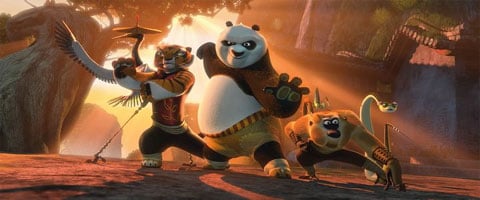
I’m curious, is it more challenging to create an original film or a sequel? Obviously when you’re creating an original you kind of have to build a whole world, but when you’re writing a sequel you have to just keep to developing.
GB: They both have challenges but I would always prefer a sequel. One, because the world in general is already there, the main characters, at least, are already known to us, the performances also inform the writing. That’s a lot easier. And the challenges would be, well how do you top what you’ve done before without repeating yourself. But I’d much rather have that challenge than starting from scratch in a, here’s the biggest advantage for us, the biggest advantage for the sequel, we already know going in that there’s a certain amount of love for his character. The world has accepted these characters. If they hadn’t, then there would be no opportunity to do the sequel and so at this point the burden is on us to not screw it up. But I’d much rather go into a situation where there’s a lot of goodwill that we can build on, rather than the alternative where, we’ve got projects where we work just as hard on our successes as we do on our failures and it’s always a surprise whether or not the world embraces what you’ve done. So just that needy side of me says I’d rather continue what I love and the world cares for as well.
JA: It’s the flip side, too, of people seem so cynical too, about sequels, it’s all the headlines: “It’s the Summer of Sequels”, “Oh Hollywood, all they wanted...” its as if the only reason people are making these movies is because the first ones did well, instead of saying the reason they’re making these movies is because the first ones did well because people responded to them and want to see these characters do something else. I don’t think, I think the audience wants to see many of these sequels and I think the press often feels that people don’t. There’s a bit of a disconnect and that these are just cynical, cash grabs instead of people who love these characters wanting to... Like in TV, if they make another season of something, people don’t say, “Why are they, season five? What was wrong with just four seasons?” You want to see these characters grow.
GB: Although, in TV and movie franchises, it becomes clear when you’ve worn out your welcome. And the marketplace lets you know that too. And maybe the marketplace tells you know that a year or two after the critics do. At some point it becomes clear.
Something you said I’ve been curious about. When it comes to sequels, obviously you have the voice cast established. When you’re writing dialogue, do you find yourself actually playing to those strengths, do you have those voices in your head while you’re writing?
JA: Certainly Jack’s voice. We’ve written another project with Jack so I feel like Jack’s in us somehow. And you know Seth Rogan’s voice and I guess Jackie Chan’s voice, but usually what happens is it’s very iterative. We’ll write a line for them and then they’ll go in for a recording and do those lines and then expand on them and change them and that will come back to us, and it goes back and forth, back and forth, for the two and a half years it takes to actually animate one of those. So you’re always finding new flavors I guess, especially with Angelina who got to play a lot more subtle scenes in this movie as playing Po’s ally more than in the first movie where she was playing kind of the obstacle and her role was to be the harsh one. So that’s a way to keep these movies fresh too, is that you’re taking your characters and putting them in situations where you get to see the other aspects of the character that you didn’t really have time for in the first movie.
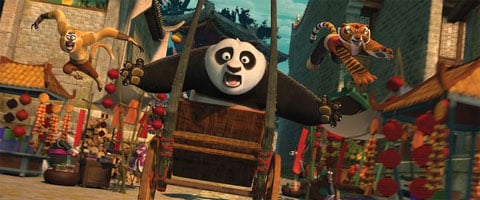
And actually another, just talking about the development from the first film to the second film, I actually know that this is a lot darker. Obviously there are goofy elements but it does have the search for identity, the search for inner peace. It’s much darker. I was wondering if you could talk about moving in that direction.
GB: Yeah, that nature of the story we were trying to tell in the first movie was more exuberant only because it was the underdog trying to achieve the impossible dream. A big, fat panda wants to learn kung fu, well that’s silly and it’s certainly going to inspire a lot of physical comedy along the way. And then when you end a movie like that and started thinking about what the sequel might be, well how do you tell a next movie if the guy’s already, if his dreams have already come true? And then for us, we started exploring the answers, they all seemed a lot more internal and emotional and the question became, what happens when your dreams come true and you’re still not happy or there’s still something deep inside that’s bothering you. I think you combine that certainly with the idea that, it becomes pretty clear that his father is not really his father, and in all those story lines pointed in kind of, I don’t know if darker is the right word, it’s certainly deeper, more emotional, and as you pointed out there’s still plenty of fun to be had. But the themes are definitely more serious. It’s also a fun change of things for us to write. It was a nice, new kind of movie for us to make.
It was also very much in the line of classic kung fu films. Just the idea of the warrior searching for who he is, there’s a long history of that. I’m curious, did you guys take any inspiration from anyone?
JA: I think the early would, I’d say Kung Fu Hustle before we started working on the first movie we’d seen and that was what drew us when we were offered Kung Fu Panda, to think, “Oh, you can do a kung fu movie that is sort of ridiculous and slapstick but also it had a lot going on in its center” and it also had a character trying to, an underdog character trying to figure out, “Who am I? Is this who I am or is this mythical warrior with the five...” what was his white fist? The “Buddha palm.” So to take that and put that in the first movie, that was one of our inspirations. But that movie’s like House of Flying Daggers, which we watched a lot and kind of pulled elements into this movie with the villain and kind of think, well if this was a more mental villain rather than necessarily a physical one.
GB: We actually looked at a bunch of westerns. Because effectively, the kung fu genre and the western serve sort of the same purpose, culturally. So that was a big deal for us to, because Po in this movie is more akin to the existing sheriff who’s got more trouble. Basically, something new is coming to town and the newly minted sheriff has got to deal with it. That was actually a very comparable genre to look at as well.
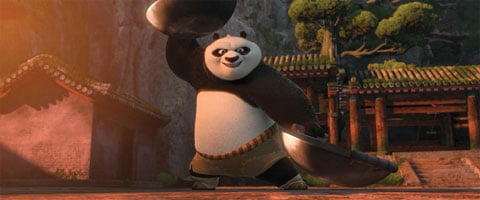
I actually just, kind of on the other note there also seems to be Shakespearean elements. Would you agree with that?
JA: I’d say Shakespeare combined with, well we would refer to Po as “Poses.” It got left in the basket. So I think we pulled from all the myths and all the ancient stories we could because I know it sounds ridiculous because we are talking about a panda who does Kung Fu, but you try to find from your sources a lot of deep, serious stuff, because it balances out a lot of ridiculousness. We’re not unaware that there’s a certain amount of absurdity in a panda doing all these things, but if you balance that with stories from the bible, stories from Shakespeare, all this classic mythical stuff.
GB: Actually, I had a conversation with my seven and nine year old yesterday about, they’re giving me a lot of credit I don’t necessarily deserve because they thought it was really neat how, and I’m not gonna give anything away, but how the villain, there was a prophesy and he tried to avoid his own fate by taking other actions, but that actually in a weird way might have just confirmed his fate, and what if he hadn’t done X, maybe Y would never have happened, and their minds were blown, they’re basically seeing a kids’ version of Memento. And I said, “Well you guys are just too young to have read, there’s something called Oedipus that’s very similar” and clearly we drew inspiration from that, I mean if you see the movie there’s quite a bit of, trying to avoid one’s fate only confirms it.
JA: I hope you didn’t explain what exactly Oedipus has done that he’s...
GB: I explained that to both my children later in bed [laughs].
That is another thing I wanted to talk about. The character Lord Shen, for starters, how did you decide that a peacock was the villain that you wanted to choose.
JA: It was both fate and luck and well I’ll put it this way, when we were first starting to come up with the movie, we had asked to see character designs of characters who didn’t make it into the first movie. One of them was a peacock and it had stuck with us because we felt that Tai Lung was this strong, really tough villain, and it would be great to give Po a nemesis who was a little more mental. Shen kind of moved a little bit in the end, he became a little bit more badass in his kung fu, but initially we were thinking he would be a little bit more finicky and a little bit more preening as a peacock would be, and a little bit more proud, and that pride would be the thing that causes his fall. So we started with the peacock and then the peacock who developed this weapon, and then it kind of moved on from there. Realizing, well, maybe a peacock who doesn’t know kung fu isn’t as fun of a movie as one who does know kung fu but is insecure enough that he also develops this weapon knowing that it will be stronger than kung fu. Knowing that there were these warriors out there, we felt like he was the bad guy going town to town, killing the sheriffs. And then Gary Oldman, we’re thinking all right, now the craft, evilness part is kind of taken care of because he can do the evil thing, but no one wants to see a character who’s just evil. So he brings the vulnerability and also the sense of humor, because I think the best villains actually what they’re doing, because if they didn’t then they wouldn’t be villains anymore. He’s such a smart guy, such a smart actor that he could bring to the character this feeling that he was a step ahead. And then even in the moments where he realized he was a step behind, he would try to overcompensate for that which is great to see. Lucky for us to have someone like that coming in as a legend.
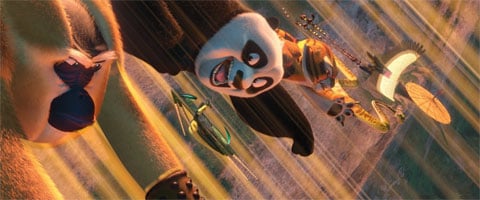
Obviously you guys are filming grown men, and you mention you have children, but I’m always curious about how you know that what you’re writing is going to play to a younger audience? How do you know that?
GB: Well, the giant advantage we have is that the main character’s a panda who’s played by Jack Black, I think, who also does kung fu. Those are three ingredients that are already working in our favor. But aside from the fact that Jon and I have six children between us and we have a fairly, we’re reminded on a daily basis what kids find funny, we are also sufficiently immature. If we’re enjoying it... I think we’re also thoughtful people, that if we like it, and we’re a writing partnership so it’s not like one of us thinks something’s funny and it goes in the script. It’s one of us thinks something’s funny, sends it to the other, the other either laughs or doesn’t. So it’s already gotta pass that test. And then to even stay in the script over the course of a three or four year process, it’s gotta make many other people laugh and keep being funny for many years after you’ve seen it a hundred times. So there’s all those checks and balances. But I think the bottom line for us as writers is we write what makes us laugh, and luckily that sensibility seeks to be shared with grownups and children everywhere.
JA: I think everyone making the movie, Jen, the director, Melissa, the producer, felt let’s make a move that we would enjoy and trust that the children of the audience can follow it. And you don’t want anything so confusing that they’re lost, but kids are very good at either not being held up by something they don’t understand, or filling in the blanks and just going with it. So we always felt that if you can just keep the parents entertained, that’s our goal. Let’s make a movie that we would want to see and trust that the children and our kids will enjoy it too. Last night was the first time that our kids saw it with us, so to be able to look over at them and see that they’re engrossed and they get it, they’re understanding what’s happening, I think proves that you don’t have to just talk down to the kids because you’re afraid of losing their interest. And if you are a little bit above the kids and force them to pay more attention, you make them work a little harder, that’s a little more rewarding.
GB: Did you hear Nathan, by the way, giggling the entire movie? It was crazy, my son would not stop.
JA: Didn’t you hear me turn around and “Shhh!”
GB: I said, “Honey, you’re missing the lines, you’re laughing too much.”
And that was only part one! Stay tuned for part two coming later today right here on Cinema Blend!

Eric Eisenberg is the Assistant Managing Editor at CinemaBlend. After graduating Boston University and earning a bachelor’s degree in journalism, he took a part-time job as a staff writer for CinemaBlend, and after six months was offered the opportunity to move to Los Angeles and take on a newly created West Coast Editor position. Over a decade later, he's continuing to advance his interests and expertise. In addition to conducting filmmaker interviews and contributing to the news and feature content of the site, Eric also oversees the Movie Reviews section, writes the the weekend box office report (published Sundays), and is the site's resident Stephen King expert. He has two King-related columns.
